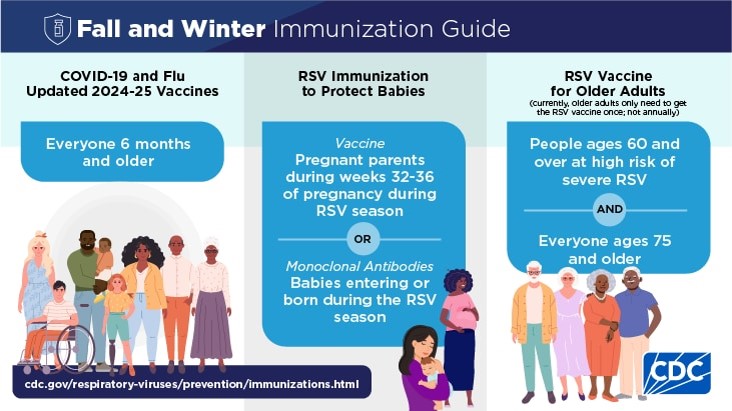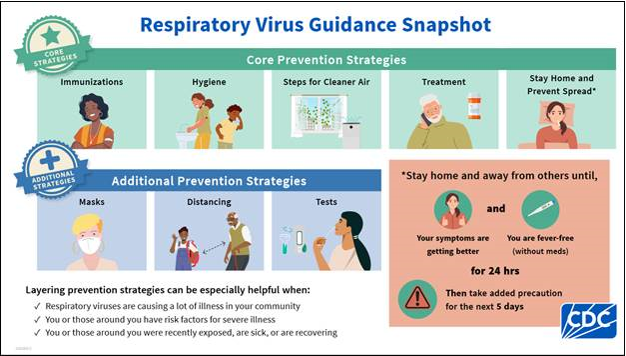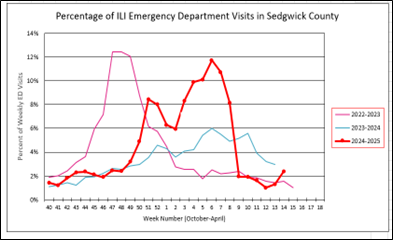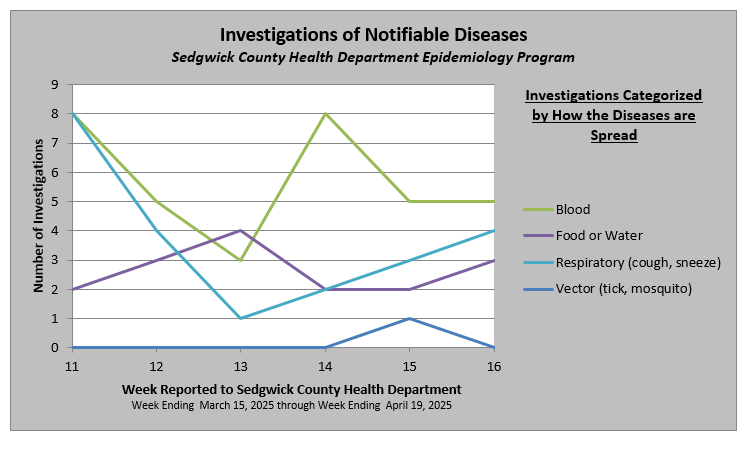Community Health News
Measles Outbreak Updates
Last Updated: Updated April 25, 2025
Measles in Kansas
As of April 23, the Kansas Department of Health and Environment (KDHE) has confirmed 37 cases of measles in the southwestern part of the state. Data from KDHE indicate all 37 cases are in a combination of 8 counties: Finney County (<6 cases), Ford County (<6 cases), Grant County (<6 cases), Gray County (6 cases), Haskell County (8 cases), Kowa County (6 cases), Morton County (<6 cases), and Stevens County (7 cases) (KDHE suppresses case counts of less than 6 in a county).
- Thirty-one (31) of the cases were unvaccinated, and most are school-aged children.
- Genetic sequencing of the first Kansas case matches the Texas outbreak, although the source of exposure is still unknown.
- This marks the first measles outbreak in Kansas since 2018.
Measles in the United States
As of April 24, 2025, a total of 884 confirmed measles cases were reported by 30 jurisdictions: Alaska, Arkansas, California, Colorado, Florida, Georgia, Hawaii, Illinois, Indiana, Kansas, Kentucky, Louisiana, Maryland, Michigan, Minnesota, Missouri, Montana, New Jersey, New Mexico, New York City, New York State, Ohio, Oklahoma, Pennsylvania, Rhode Island, Tennessee, Texas, Vermont, Virginia, and Washington.
There have been 11 outbreaks (defined as 3 or more related cases) reported in 2025, and 93% of confirmed cases (820 of 884) are outbreak-associated. For comparison, 16 outbreaks were reported during 2024 and 69% of cases (198 of 285) were outbreak-associated.
Measles in Texas and New Mexico
Texas
The Texas Department of State Health Services (DSHS) is reporting an outbreak of measles in the South Plains region of Texas (near Lubbock).
As of April 22, 624 cases have been identified since late January. There have been two measles deaths in unvaccinated children with no underlying conditions linked to this outbreak.
New Mexico
The New Mexico Department of Health (NMDOH) is reporting an outbreak of measles in Lea County, near Gaines County, Texas. This outbreak is linked to the Texas outbreak.
As of April 22, 65 cases have been identified since February 2025. One death occurred in an adult, but limited information has been released about this person.
RESOURCES
Measles (MMR) Vaccine Recommendations
Measles* (Center for Disease Control & Prevention)
* External Link
Respiratory Virus Updates
Every year, respiratory viruses such as influenza (flu), COVID-19, and respiratory syncytial virus (RSV) cause illnesses, hospitalizations, and deaths during the fall and winter virus season.
Many respiratory viruses share common symptoms, like coughing, sneezing, runny or stuffy nose, sore throat, fever, and chills. Other symptoms include fatigue (tiredness), decreased appetite, vomiting, diarrhea, headache, and muscle or body aches. Sever infections can lead to serious lung infections, such as pneumonia.
What do I do if I have a respiratory virus?
- The CDC recommends you stay home and away from others until at least 24 hours after both your symptoms are getting better, and you have not had a fever (and are not using fever-reducing medications). After that time, you can resume normal activities, but should use added precautions (wearing a mask, staying away from those at severe risk for illness, etc.) for another 5 days.
How do I protect myself from a respiratory virus?
- The best way to prevent respiratory viruses are through vaccinations. Vaccinations are available for flu, COVID-19, and RSV (for select groups eligible for RSV vaccine). Find out more about immunizations for respiratory viruses at https://www.cdc.gov/respiratory-viruses/prevention/immunizations.html or view the image below.

- Other prevention methods include washing your hands and staying home when you are sick.

Influenza Report for Week Ending April 19, 2025
Nationally influenza activity continues to decline. The percentage of influenza-like illness (ILI) visits to selected outpatient clinics was at 2.4%. One state experienced high or very high ILI activity, one state experienced moderate ILI activity. All states (including Kansas) experienced low or minimal ILI activity.
Of influenza, viruses detected and subtyped this season, 33.2% have been influenza A and 66.8% have been influenza B. To date, all viruses that CDC has typed match the vaccine strains. There were six influenza-associated death reported for the week ending April 19.
PREVENTION
Influenza (also known as “flu”) is a contagious respiratory illness caused by influenza viruses. It can cause mild to severe illness, and at times can lead to death. An annual flu vaccine is the best way to protect against flu. Vaccination helps prevent infection and can prevent serious outcomes in people who get vaccinated but still get sick with flu. The CDC recommends that everyone ages 6 months and older get a flu vaccine.
Emergency Department Surveillance-Sedgwick County Ending April 19

Notifiable Disease Investigations
